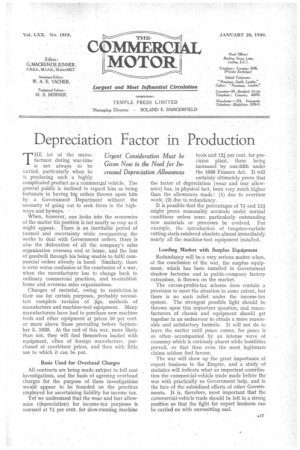Organizing Road Transport for Defence
Page 19

If you've noticed an error in this article please click here to report it so we can fix it.
AT last the value of road transport in case of war appears to be becoming fully appreciated, even by the Minister of Transport, who, in his introduction to a new official document, "Organization of Road Transport for a Defence Emergency," alludes to "our great national asset of road transport." Hitherto the attitude of the Ministry, no doubt inspired by a 'railway complex, has seemed to imply that traffic by road is more of a liability than an asset. It is strange how ideas about a person change when he is required to do a real job of work, and the same thing seems to apply in such a case as this.
However, for the sake of the nation we are thankful that definite action is being taken. The Minister states that the plans for road transport must work smoothly from the very beginning of an emergency. Road transport employs 500,000 vehicles with some 200,000 operators, and under war conditions full use could not be made of the industry if there were thousands of individuals each going his own way. Neither an army nor a convoy of lorries can prosper under a debating society. The whole basis of the plan is that all classes of operator working under A, B or C licences should, in peace time and without interfering in any way with their ordinary business, voluntarily form themselves into working groups operative only during war; choosing, so far as possible, their own leaders, through whom the Government can secure the best use of the vehicles, and of the fuel without which they cannot move.
Immediate Operation of Plan.
In an interview Mr. Burgin said that this was not a theoretical plan, but one that could be put into operation immediately. Secrecy had had to be dispensed with, because when secrecy interferes with efficiency the latter must come first. He emphasized that the grouping suggested was solely for wartime purposes, an obvious hint that it was not being instituted with any ulterior motive. As an inducement to operators to volunteer, he pointed out that those not coming into the group ing scheme would undoubtedly find it difficult to obtain fuel supplies. The groups would receive their requirements, but the first call would, of course, be that coming from the Government.
Rail transport in such an emergency would be asked to deal, so far as possible, with the passenger side of transport, so as to relieve public-service vehicles for other work and enable them to conserve .fuel supplies. This appears to us as unintentional praise of road transport's value.
Dividing Goods Vehicles Into Groups.
In each traffic area the Minister's representative for the scheme is the Chairman of Traffic Commissioners and Licensing Authority. To each district in an area will be sent a district transport officer, who will be a Government official answerable to the chairman. Districts will be divided into subdistricts, each with a manager connected with the industry and nominated by operators who have joined recognized groups. During peace he will have no duties, but in emergency will deal with fuel rationing and general operation.
The " shadow " groups, as they are termed, will consist of from 25 vehicles to 100 vehicles, with smaller numbers in special cases or larger where the vehicles are all owned by one concern and comply with certain conditions, including localization, and each group should consist, where possible, of vehicles used during peace for the same kind of work.
Grouping will not apply to fuel and oil tankers and vehicles for the convenience of abnormal indivisible loads. Membership will be for one year with permission to give three months' notice to leave after that period.
Arrangements have also been made for the earmarking of vehicles for the armed forces or civil defence services, to be notified to each chairman by .the Government department or service concerned. After the receipt of the booklet on organization any operator approached to arrange such earmarking should refer the matter to the appropriate chairman.




















































































